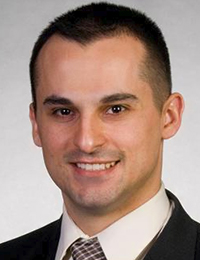Going Green: Driving an Environmental Message in the Midwest
 Joseph Wright
Joseph Wright
Civil Engineer, LJB Inc.
Joe Wright has lived all over the United States — growing up in Florida, attending college in Ohio, and spending some time working in Seattle. Along the way, he’s noticed big disparities in the way different communities and regions approach transportation policy.
In Seattle, Joe observed, people embrace transit and other alternatives to the automobile. In Cincinnati, where he currently lives and works, most people drive everywhere, and those who take public transportation do so only because they have no other options.
With a background in civil and environmental engineering, Joe realized he could steer his career in the direction of addressing the transportation challenges facing society today. And he found the perfect vehicle for this journey: the Master of Sustainable Transportation program at the University of Washington.
A Change Mentality
Joe knew he faced an uphill battle advocating for sustainable transportation measures in a region that is structured around traditional highway development and long car commutes.
"Urban planning in the Midwest is what it is. You're not going to change the mentality of everybody wants their land, nobody wants to share walls," he said. "But you may be able to have an impact on sustainability at a community level. But I didn't know how to do that.”
That’s when he found the UW program.
“I came across the MST program and I was like, ‘This is what I’m looking for,’” he said. “It focused on the kind of environmental, societal and policy changes that can improve the situation on a step-by-step basis.”
The Online Advantage
Even though he lived in Ohio, Joe was able to earn a master’s degree from the UW because of the program’s online format. The timing actually worked out perfectly with his schedule.
“When I first started the program, I had a three-month old son. Then we had our daughter,” he said. “But it actually was very convenient for me — I could put my two young kids to bed and then go to school.”
Joe also appreciated the diversity of experience he found in his student cohort, thanks to the online nature of the program.
“I'm a transportation engineer from the Midwest, and I'm dealing with Patrick, who is building electric fueling stations out in California for electric cars; Nick, who works for Zipcar in Seattle; and Anna, who works for Amazon shipping,” he said. “Just the background that everybody brings, both in terms of work and in their societal viewpoints, was extremely valuable.”
Applying New Tools
When Joe looked at the transportation projects his engineering firm was working on, he saw great potential for improvement based on what he learned in the MST program. He began to apply a sustainability lens to the company’s road projects, including ways to reduce runoff pollution, recycle the pavement, conserve energy and increase safety.
As part of Joe’s capstone project, he earned Sustainable Transportation Professional certification from the nonprofit Greenroads, a program he learned about in one of his MST classes. That paid immediate dividends at work.
"I wanted to make my capstone not only useful in terms of education, but very applicable to what I do in everyday life as an engineer," he said. "That's when I decided to get certified with Greenroads, and then I did a case study using an intersection in Fairfield we were working on. That was the first Greenroads-certified project in the state of Ohio, and we ended up winning an outstanding achievement award for that project."
The project is a great example of how sustainable transportation practices can deliver a variety of positive impacts, including financial benefits.
“The beauty of the MST program was it equipped me with so many tools," Joe said. "I can come into any meeting with a client and say, 'I realize that your goal here is to improve the safety of your intersection. We can do that for less money and also build a more sustainable system, which'll be like a gold star on your project with your community. It will also improve physical safety, as far as reduced traffic accidents and things like that.'"
Looking Toward the Future
Although he can’t fix the world of transportation policy by himself, Joe sees sustainability work as an important long-term strategy, both for the industry and the planet.
“If we can just reduce the amount of energy used and the pollution created from construction in general, we're going to have a significant impact,” he said. “People are acknowledging the fact that climate change is real. The more we can reduce our impact on that and get back to a more natural cycle of things, the better off we are.”
Ultimately, Joe sees his job as more than just engineering a better roadway or intersection. It’s about helping people have better lives.
“At the end of the day, I think our goal as transportation engineers is to improve the quality of life for the people that live around us,” he said. “If we're not improving air quality, improving the social justice of the community, providing more efficient transportation, more affordable transportation, then we’re not doing our job.”